This is the sixth essay in an occasional series. Previously: Part 1, Part 2, Part 3, Part 4, Part 5
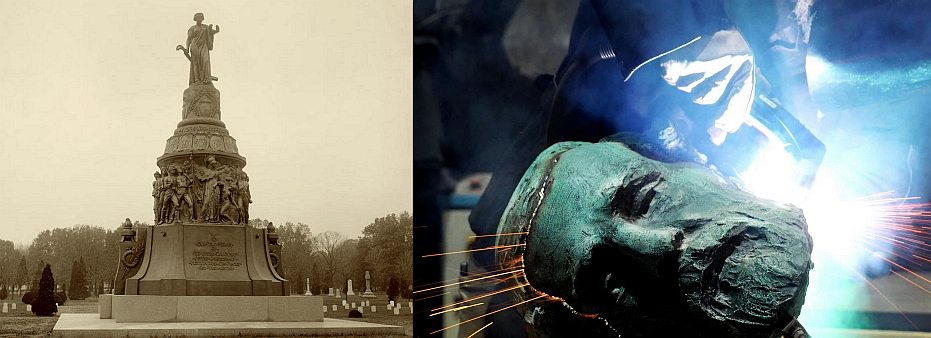
Requiem for a Culture
Part 6: The End of Reconciliation
The past is never dead. It’s not even past.
— William Faulkner, Requiem for a Nun, Act I, Scene III (page 80 in the Vintage paperback edition)
Southern partisans, especially those who have ancestors who fought in the War for Southern Independence, are well aware of the depredations that have been visited upon Southern monuments in the last three or four years. The process culminated late last year with the desecration of two cherished monuments, the statue of General Robert E. Lee in Charlottesville, Virginia, and the Confederate Memorial at Arlington National Cemetery. I’ll give a brief recapitulation of these events for readers who may not be familiar with what happened.
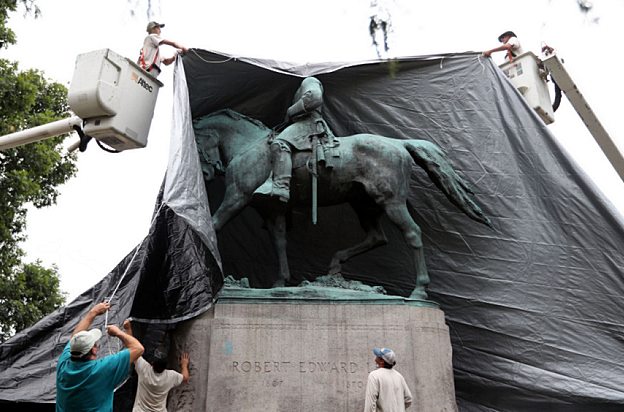
A bronze statue of General Lee, the commander of the Army of Northern Virginia, had stood since the 1920s in a little park next to the library in downtown Charlottesville. The “Unite the Right” false-flag fiasco in 2017 started the ball rolling on the statue’s removal. Late that summer General Lee and his horse Traveller were covered with a burka to prevent passers-by from being triggered by the sight. Then in 2020 the fentanyl overdose of Saint George Floyd provided the coup de grâce: the following year the statue was finally removed from its plinth. To make sure that the South would never rise again, last October the revered general was cut into pieces and melted down.
The widely-published photo of General Lee’s molten bronze face was like a knife in the heart for Southern partisans (or at least for this one).
The second destructive event is not as well-known as the immolation of General Lee, but may well turn out to be even more of an outrage from the perspective of those who revere the memory of the men who fought and died for the right of Southern states to be free of Federal tyranny. I refer, of course, to the renowned Confederate Memorial at Arlington National Cemetery.
The national memorial for Confederate soldiers was commissioned by the United Daughters of the Confederacy in the early 1900s. It was designed by the widely acclaimed sculptor Moses Ezekiel, a Confederate veteran as well as the first Jewish cadet to be enrolled at the Virginia Military Institute. Completed in 1912, the monument was unveiled in 1914 in a ceremony that featured a speech by Woodrow Wilson, and was attended by numerous grandees from both the North and the South.
A full account of Moses Ezekiel’s monument would be too long for this space, and would require a deeper knowledge of the topic than I possess. For an excellent overview, I recommend this article by Richard Hines at Chronicles.
Last December the Arlington monument was dismantled and removed from its pedestal by the Army (which owns it) and moved to an unknown location. Its final destination has not yet been announced, and it may or may not eventually be melted down (see this article from The Northern Virginia Daily).
The national Confederate Monument was above all intended to be a memorial of reconciliation, bringing together the two sides in the Recent Unpleasantness so that they could coexist in the same polity without rancor and recrimination. Southern soldiers were thereby honored as patriotic and courageous fighters for their home states, and accepted as such in the official collective memory of the new (and now completely Federal) republic.
Mind you, the Northern hegemonists had an ulterior motive for embracing reconciliation: they needed the fighting prowess of Southern soldiers for their new wars of Manifest Destiny. Confederate soldiers had shown themselves to be a superior fighting force, and only lost to the Yankees because they were so badly outnumbered and so ill-supplied. Southern boys, especially the pugnacious Scots-Irish of the southern Appalachians, have been the mainstay of the U.S. military ever since. Whenever Uncle Sam deployed troops abroad to make the world safe for democracy, the descendants of the Confederacy were in the van bearing the brunt of the fighting.
That’s what reconciliation was for. But reconciliation is now officially dead.
For the first time since the late 1800s, Southern “cracker” families are discouraging their sons from serving in the military. The U.S. government and the armed services have made it clear that they have no respect for the Confederate heritage, and nothing but contempt for the descendants of those who fought for the Stars and Bars from 1861 to 1865.
So they’re on their own now. When the pink-haired correctly-pronouned trans creatures go forth to fight the next war with Russia, or Iran, or China, or whomever our neocon masters decree to be the enemy, they will do so without the assistance of Southern partisans.
If the rebel yell is ever heard again in combat, it will be in a completely different kind of war.
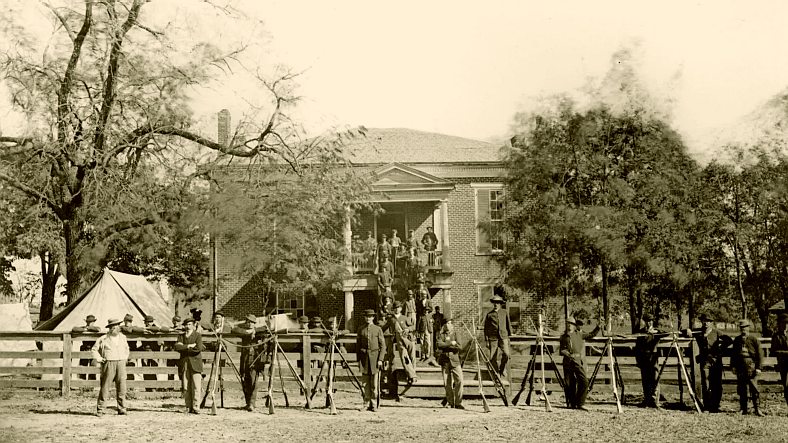
Today is the 159th anniversary of the Confederate nakba, the surrender of Robert E. Lee to Ulysses S. Grant at Appomattox Court House on April 9th, 1865.
In honor of the occasion, I present the story of the encounter between General John Brown Gordon, CSA, and General Joshua Chamberlain, USA, that took place at Appomattox three days after the surrender. More than any other occasion, that incident exemplifies the spirit of reconciliation that the Confederate Memorial at Arlington National Cemetery was intended to convey.
This is quoted from “The Last Salute: Gordon and Chamberlain at Appomattox”, published by Ultimate Flags:

It is the 12th of April, 1861. Three days ago, in the late afternoon, Robert E. Lee and Ulysses S. Grant had met at Appomattox.
Now men in grey and blue are gathering. There is tension, but no fear. A valley separates them, the Confederates on one hill, the Federals on another. These are seasoned veterans, and they all understand what is about to happen. They and their commanders have faced each other before: some of these men have been fighting since the first shots of the war, their flags inscribed with the names of battle waged over four years.

General Gordon commands the Confederates. He already had battle scars when he was shot four times at Antietam, and continued to lead his men. It took a fifth bullet that same day to finally bring him down. Wounded again at Shepherdstown, West Virginia, blood streaming from his head, he again carried on with his command.
Today, sitting on his horse, his leg aches from another bullet he took just 18 days ago. None the less, Gordon leads his men off the hill and into the valley, toward the Federals.
General Chamberlain watches the approaching Rebels. He, too, sits astride his mount, but his men are dressed in blue. Chamberlain has also faced everything the war could throw at him. A former college professor, he has been wounded six times, had six horses shot from beneath him, and earned the Medal of Honor for his actions at Gettysburg. An injury in 1864 was so severe that his death was reported in newspapers.
Like Gordon, Chamberlain is nursing a new wound. Shot in the chest two weeks ago, knocked unconscious and thought dead, his demise was reported in a telegram to New York. Chamberlain later wrote that his reappearance brought a wild response from men on both sides:
“I was astonished at the greeting of cheers… Strangest of all was that when I emerged to the sight of the enemy, they also took up the cheering. I hardly knew what world I was in.”
These two remarkable generals, and some of the most rugged soldiers in history, are closing on each other. Their meeting was arranged just three days ago, at Appomattox: Gordon to surrender arms and flags, Chamberlain to receive them. In Chamberlain’s words:
“Before us in proud humiliation stood the embodiment of manhood: men whom neither toils and sufferings, nor the fact of death, nor disaster, nor hopelessness could bend from their resolve; standing before us now, thin, worn, and famished, but erect, and with eyes looking level into ours, waking memories that bound us together as no other bond; was not such manhood to be welcomed back into a Union so tested and assured?”
What happens next, though, is not part of the plan. Chamberlain explains:
“With my staff I was on the extreme right of the line, mounted on horseback, and in a position nearest the Rebel soldiers who were approaching our right.
“Ah, but it was a most impressive sight, a most striking picture, to see that whole army in motion to lay down the symbols of war and strife, that army which had fought for four terrible years…”
“The momentous meaning of this occasion impressed me deeply. I resolved to mark it by some token of recognition, which could be no other than a salute of arms.”
Chamberlain, without orders or permission, performs a noble act:
“When General Gordon came opposite me I had the bugle blown and the entire line came to ‘attention’…
“Gordon at the head of the column, riding with heavy spirit and downcast face, catches the sound of shifting arms, looks up, and, taking the meaning, wheels superbly, making with himself and his horse one uplifted figure, with profound salutation as he drops the point of his sword to the boot toe; then facing to his own command, gives word for his successive brigades to pass us with the same position of the manual, honor answering honor.”
Chamberlain was criticized by some for the salute, but he was unrepentant. Many years later, Gordon, in his own memoirs, called Chamberlain “one of the knightliest soldiers of the Federal Army.”
Based on my experience hanging out with the Sons of Confederate Veterans, I can assure you that the 110 years of national reconciliation have now come to an end. The powers that hold sway in Washington D.C. and Richmond have repudiated the Confederate heritage of the South. They have arrogated unto themselves the authority to dictate who is to be honored and who dishonored, and even who is to remembered and who forgotten.
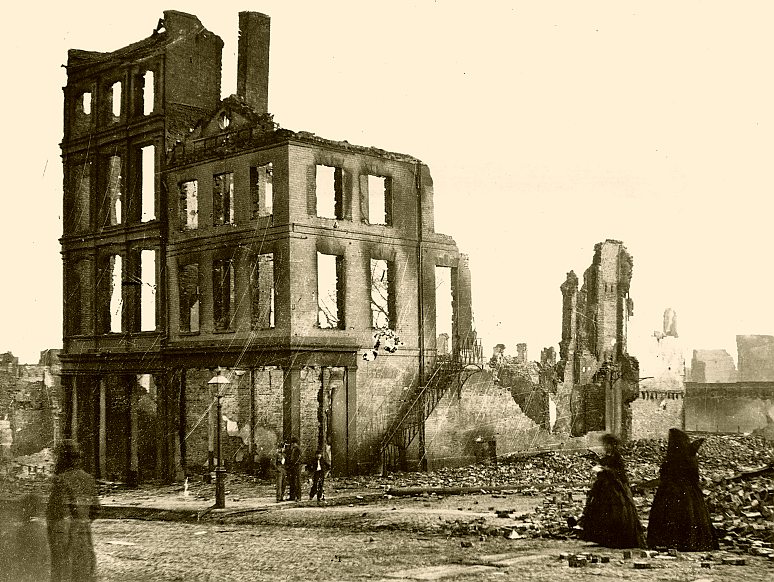
Reconciliation is dead and gone. Something will eventually emerge to take its place, but it’s too early to say exactly what that might be.
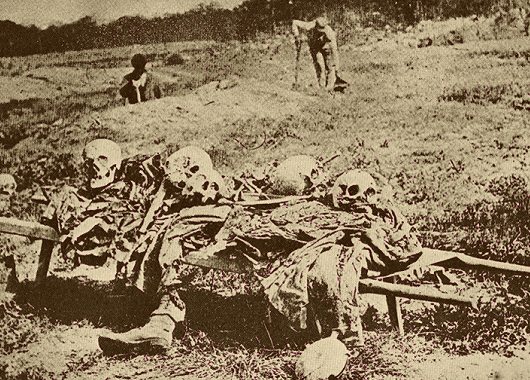

In my younger days I participated in Living History reenactments, mostly Federal, Civil War and immediate post-Civil War frontier. Artillery for Civil War and Dragoon Horse Artillery for after the Civil War, including at National Parks. A few times, I did Confederate because we were short-handed. It did not matter to me because what I was doing was teaching American history to Americans. There was no hostility between the sides as we portrayed. We were all teaching our country’s history.
If the reconciliation after the Civil War is over now, and it may well be, then what are the odds of any reconciliation during and after our current political differences when CW 2.0 is a possibility? Something to take into account for the future.
Subotai Bahadur
This series has been excellent. Really well done.
Thank you.
Many years ago I attended a reenactment of a civil war battle at Shiloh National Park in Tennessee.
I remember the clouds of smoke from cannons filled with gun powder and people in their Confederate clothing. They were not uniforms but old clothing that poor Southern soldiers would wear.
There was feverish shouting because the participants were serious about why they were ‘fighting. They had muskets and other weapons.
It was a very memorable time for me.
It is strangely difficult to get the history of the South straight; authors and historians seem to be obsessed with ‘slaves’ and ‘plantations’, the minority 2% . Finding out what life was like in the suburbs of Atlanta, for example, is difficult, it is as if the residents of the cities just did not exist.
These are the people who were fighting against Federal Tyranny, they were ambivalent about slavery, there was always fears of slave revolts. It must have been a bit like living in the Gaza periphery….
The Civil War brought us the first mass casualty war, the shock must have been enormous, I think the voyeurs of 1st Mananas/Bull Run were expecting a few musket volleys and then a party. They were sadly mistaken.
It seems to me unclear whether Lincoln actually had the right to invade Virginia, to a foreigner, it is difficult to understand how ‘preserving the Union’ was not ‘building back better’. a.k.a. making it up as you go along.
But Lincoln won and got to write the history. And St.Barry Soetero got to rewrite it…..
Methinks you’re got it correct, MC.
Slavery was <2%. Financial chicanery by Wall Street and DC taxes, tariffs and import duties to make Southerners pay more for items was a big cause, as was the actual invasion of their homes.
As one Confederate POW was asked by a Union soldier: "Why are you fighting us?"
The Southerner simply replied: "You're down here on my land without my permission or consent."
Amen. Though there were a few slaves in my part of Virginia, there were no plantations. Our real history is so different from the “plantation” stereotype that local presenters usually begin by identifying it with the “Western” stereotype. My town (called Estilville up to the 1890s) was Gate City, the Gateway to the West. (The only excuse for calling it a city is that in the 1890s its population was increasing.) Our ancestors were more like Daniel Boone than like Scarlett O’Hara.
And in the interim generations, a lot of them have served in a military unit whose specialty is building and demolishing bridges. Our young people would be missed, if they let pink-haired trans-creatures put them off the US Army.
(Another fun fact from history: Colonel William Peters, of Marion, Virginia, was the one who persuaded General Lee to adopt a policy of protecting non-combatants from the war as much as possible. In those days the distance between the towns seemed long, so the Colonel may not have met his cousins in Gate City. He had several. Most of them seem to do construction work as a hobby, if not as a job, and many of them learned to build houses by building bridges in the Army.)
Baron, you have really surpassed yourself in this series…. bravo!
In this, the third decade of the 21st century, Americans are told that they live in the most-equitable and just society possible, one in which prejudice,bigotry and hatred have been eradicated by the present regime and its supporters. But this is a bright shining lie, for there remain a number of socially-approved forms of hatred and bigotry which remain firmly embedded in what passes for polite society these days.
Perhaps foremost among these are the last forms of socially-acceptable bigotry in the U.S.A. – namely bigotry against rural Americans, Christians, working class and blue-collar people, and last but not least, white southerners.
I was born in the south, but have not lived there in many years and hence do not possess any regional accent to give myself away. However at heart, I remain a southerner by birth and inclination, and if I had a dollar for every time I heard or saw someone patronize, insult or denigrate those folks listed above, I’d be a wealthy man.
Honestly, it has been going on for years. The only reason most people don’t see it is that they have become inured to it. Like a fish swimming in the ocean who does not even realize the wetness of water, these oblivious types take for granted this polite bigotry, which is all they’re ever known.
It dates back to the 1970s and the popular sit-com “All in the Family,” whose protagonist ~ Archie Bunker (played by Carroll O’Connor) ~ was a blue-collar working stiff and an exemplar of all of the worst traits Hollywood screenwriters could imagine and dream up for him. Around that time, too, is when the Democrats and the political left flipped from being supporters of the working man to being amongst his biggest abusers.
It has all gone downhill from there, perhaps culminating in Barack Obama’s famous shot across the bow of rural America, whom he characterized as “clinging to their guns and Bibles…”
If the ruling class “elites” running things wish to trace the source of the disdain and even hatred these put-upon and forgotten people feel for them, their very own condescension, bigotry, and thinly-veiled hatred for the south and other identity groups considered second-class citizens would be a very good place to start. They’ve heaped abuse upon these groups for decades now, surely they didn’t expect unicorns and rainbows in return?!
Pertaining to the en-mass rejection of military service by white rural southerners et al. in recent months and years, this is one American who is pleased to see that the penny finally dropped and people now realize the dripping condescension and disdain the ruling class have – and have had – for them, the men who actually doing the fighting and dying in this country’s wars.
It is time for the neo-cons and others who so causally start these elective wars to again have “skin in the game”…. perhaps it would be a good idea to hand them rifles and ship them to Ukraine!
Dear Baron
I agree with you American military as you knew it is dead. but i disagree with you that it will become transgender. transdenderism is a tool, not a goal. it design to move out all decent personal and not allow decent personal to enter. they already removed honor from west point. soon, they will change oath from defending the constitution to defending president and congress.
but who will occupy the ranks in the military? i think you should look to the south. millions military age individuals are entering. some of them are being moved to undisclosed locations.
it looks very soon you will meet men in uniform with heavy Spanish accent.
also, police will some way merged with the military. you will be stopped and interrogated by person you don’t understand very well. and then you will hide in bushes once you spot blue and red. probably, they will use unmarked vehicles. and then you will hide once you spot non electric car speeding up the road
Good point.
I couldn’t read this without getting a lump in my throat. I can verify what this article says. As one of nine boys in my family, we all served in the military. NONE of our offspring has joined and was discouraged from doing so.
God bless you and yours. I too served, long gone are the days of encouraging service to family and friends.
Same as you, none my children, my nor relatives in the US will serve nor be of service.
The culture has been buried in a 60-year process– the long march through the institutions. A patient step by step moving of the Overton window of college and university graduates while “conservatives” left high culture in the exclusive hands of the left while focusing on “family values,” low taxes, and building “democracy” worldwide as though this were enough. And left Bubba to NASCAR, Bud, and Honey Boo Boo instead of educating a ruling elite along the Greek Paideia concept to lead and inspire Bubba to higher and specifically old-America ideas and ideals.
Here is my take from 2011 about the broken connection between yet another Virginia university and Robert E. Lee
https://www.takimag.com/article/robert_e_lees_final_surrender/ (written under my old pen name Takuan Seiyo that appeared also in GoV).
Thanks, Baron, for a moving account of a story I’d not heard. Where is that nobility now?
Well, as Max Denken mentioned just now, the long march through the institutions has destroyed nobility, and even the capacity to understand what nobility is.
While I agree with you on many points, there is one point where I disagree with you.
And that point is:
Confederate soldiers had shown themselves to be a superior fighting force, and only lost to the Yankees because they were so badly outnumbered and so ill-supplied.
Sorry, yes they were outnumbered and ill-supplied but for me the main reason they lost was the inability of General Lee to understand the aim of the war, regardless of what the politicians say.
You go for the throat of the enemy and attack. You dont diddle or daddle around.
General Lee was the reborn Hannibal Barca.
Hannibal attacked the Empire of Rome and rampaged through Italy, destroying the roman armies that were thrown into his path. But he never dared to attack Rome itself. So Rome could grow strong and then Rome unleashed the killing stroke and Carthage was dead.
The same happened in the USA. General Lee won fight after fight – just like Hannibal. And some of those battles were fought north of Washington!
WTF?
Washington was the only target that mattered. There was Abraham Lincoln, whose signature would end the war and save Southern independance.
He didnt even send Cavalry to infiltrate Washington and capture Lincoln.
No, he fought the armies, collected victory after victory, but the real trophy he didnt want.
There is a saying:
Beginners talk startegy and tactics, those in the know talk logistics.
Lee should have known that the longer the war takes, the worse it was getting for the Confederacy. Old guns, no cannon production etc, etc., cut off from the world and even Britain did nothing when the US captured a british ship with Confederate diplomats.
Yes, Lee had luck, but Luck is a fickle mistress and will abandon you when you need her the most – or when you make too many demands of her.
You go for the throat and end the war as quickly as possible. And that means Washington and nothing else.
I agree. Thought this the whole time. Gen. Early was looking
down on DC, which was not well fortified and did nothing.
The war would then have been over if DC had been taken.
DC protected by the Union and the Confederacy?
Mr. Lund,
Actually, I agree with you.
After Stonewall Jackson routed the Yankees at the Battle of Front Royal, he pursued them down the Valley, past Winchester, and chased them all the way across the Potomac into Maryland. He looked at the map and the distribution of Federal forces, and reckoned that he had a unique opportunity to get behind the Yankees and swoop down on Washington D.C. from the north, if he moved like lightning (which he was wont to do). He telegraphed General Lee and asked his permission to do exactly that, but Lee turned him down.
Jackson was always, without fail, audacious, while Lee was cautious.
However…
Regardless of that — if the South had possessed equal or near-equal numbers of troops, and if it had the wealth and manufacturing capacity to produce the requisite arms, it would have won the war. Those Southern boys were simply superior fighters.
An exception was the “Iron Brigade” made up of Union troops from the Upper Midwest. They included a large number of descendants of the Vikings, who were every bit a match for the Appalachian Celts. However, they weren’t as numerous.
If all other things had been equal, the military prowess of the South would have been enough for it to win the war.
Gettysburgh was intention to do that attack on DC from the north, only Lee lost his forward intelligence when Jeb Stuart went east and his army went west of Alleganies and Union forces stood in between. When they did meet in Gettysburgh, Lee intended to destroy the impediment to just that, only things turned out differently. One big reason Lee moved his army north to begin with was there was nothing logistically to support his army in northern VA, by summer 1863 those earlier two years mattered greatly, while Gettysburgh was coming down on him the same was happening in Vicksburg. Lee stood a better chance advancing thru that expanse of peach orchard on to round tops than in breeching enforced ramparts of DC. Yes, absconding Boothe made it through to cross the Rappahannock but that was after Atlanta and Richmond and Appomattox. Logistics were never on Lee’s side of the ledger neither at Sumter nor before Gettysburgh, luck was about all Lee had, he made the most of it to the chagrin of half a million lives, but that was more on Jeff Davis and some others more than upon Lee.
Excellent articles, one and all, Baron. This is all mostly emotion and wasted effort, to fight the removal of reconciliation, as our communist enemies take ill-disguised glee at watching our angst. The communists imagine this to be power, and of course, they are both wrong, and wasting their time. The realization that they must abandon humiliation, and reach for their murder weapons, is upon them, and us. It’s what communists have done, and always do. Using food, fuel, currency, immorality, and other weapons to murder their way to total power, statues and memorials will seem like easy losses. My hope is that the sleepers who are good people among us awaken before they become victims.
The communists are both not wrong, and wasting their time to destroy and rewrite our national historic record.
They have subsequently infiltrated our social, economic and political institutions prior to the War of Northern Aggression, continually for the past 165 plus years. Communism is an ideology. It is not necessarily a nationality
The communists will kill the useful idiot sleepers.
To kill communism, you must kill communists.
A paraphrase of Prophet’s Generals and Playwrights.
Kill them.
Kill all of them.
Kill all who come.
Then, none will come.
Of Prophets, 1st Samuel:15v1-26 (KJV).
Of Generals, Curtis LeMay and others.
Of Playwrights, Shakespeare, and others.
A philosophy I have always lived by. There is a reason why everyone to this day remembers Carthage, because it works.
As a Brit, I feel the reason the Democrats are removing these statues is to completely erase this history as it leads to things they would rather the world forgot: the KKK, Jim Crow laws and the sponsor of Bi Dung and friend of Hitlery Clinton, Robert Byrd. And the fact they haven’t changed one iota.
Dear Baron, The above is one of the most achingly poignant essays I’ve read. Makes my heart ache and my eyes water.
Thank you, Ms. Beckenhaupt.
Our forefathers may have laid down arms to stop the damnyankees from murdering raping and pillaging, but there was never any reconciliation.
Nor will there ever be.
“YOU MAY FORGIVE US, BUT WE WON’T BE FORGIVEN. THERE IS A RANCOR IN OUR HEARTS WHICH YOU LITTLE DREAM OF. WE HATE YOU, SIR.” – According to the monumental work of Shelby Foote, these words were spoken by a Confederate Officer to Joshua Chamberlain at Appomattox. In another monumental work about Stonewall Jackson-SOLDIERS SUCH AS THESE, the South could have won the war at First Manassas, if Lee and his staff had LISTENED to Jackson and pursued the corrupt Yankee army and the host of Yankee onlookers. Jackson pointed out from a strategic standpoint how DC could have been cut off from the rest of Maryland and isolated. But Jackson was not part of Lee’s inner circle and as such was ignored. The rest, as they say, is history.
I’ve heard two explanations for Lee’s policy. Being new to this site and suspecting that others here have studied the War in more depth than I have, I offer them for what youall may find them worth:
1. Lee was born in Alexandria. Though he spent most of his life further south, he may have promised old family friends to protect Alexandria. It would have been hard to attack Washington from the south while protecting Alexandria.
2. Early in the War, Colonel Peters defied orders to burn a Pennsylvania Dutch town. Peters was a descendant of German Anabaptists himself. He told the soldiers to collect food and supplies, but not to harm the Pennsylvanians. There were a lot of descendants of German Anabaptists in Virginia. They had been brought up to oppose all war, but were willing to serve on the terms the Colonel set for them–no violence toward non-combatants, striking or shooting only when it could be considered self-defense. Lee could have had Peters court-martialled but, mindful of the background of his troops, he chose to make Peters’ policy his from that time forward. It did not win the war. It did win the hearts of the people; so long as he was able to expect a short war, Lee may have seen that as gaining more than it cost.
why not fight the war before us rather than one concluded, least our boots and skulls end up on a dirty litter, put them to use in the battles at hand
Because the lessons of the past are not learned and repeated to the detriment of all concerned.
A philosophy I have always lived by. There is a reason why everyone to this day remembers Carthage, because it works.